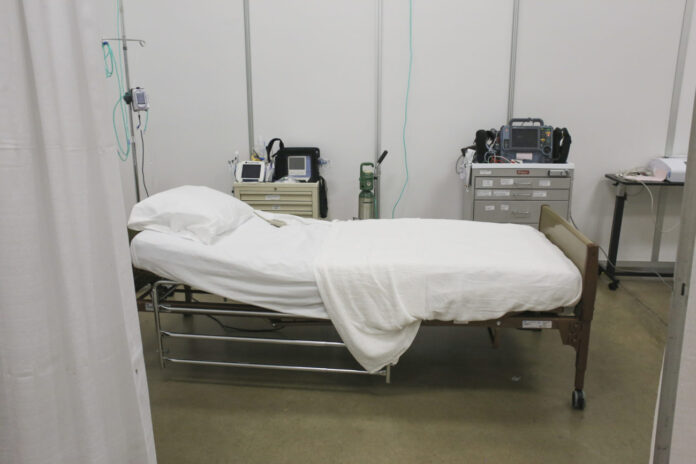HARLINGEN — The state project that turned Casa de Amistad into a temporary COVID-19 recovery center might be cutting its operations amid low patient numbers.
Since it opened in mid August, the recovery center housed in the 13,000-square-foot conference hall renovated to treat as many as 96 patients has cared for no more than 19 a day, Josh Ramirez, Harlingen’s public health director, said.
Meanwhile, state officials have downscaled the McAllen Convention Center’s recovery center, renovated to treat as many as 250 patients, to 24 beds after it treated a total of nine patients since opening in early August.
“It never reached full capacity,” Ramirez said, referring to the state’s largest COVID-19 recovery centers. “We don’t want to be wasteful. We want to be good stewards of money. We have to have a balance. We’re dealing with people’s lives.”
Now, officials plan to keep Casa de Amistad’s so-called “mini hospital” open until at least Oct. 14, Carlos Sanchez, Harlingen’s assistant city manager, stated late last week.
Days earlier, officials were considering cutting operations today.
“There’s a plan to stand the facility — cease operations — it doesn’t necessarily mean the facility will be dismantled,” Mayor Chris Boswell said.
Boswell said state officials want the recovery center available in the event COVID-19 cases spike during autumn.
Meanwhile, officials have cut back on the recovery center’s medical teams, Ramirez said.
In early August, the state transferred a 125-member staff made up of doctors, nurses and respiratory therapists to the recovery center, assigning them to three eight-hour shifts, city spokeswoman Irma Garza stated last month.
Recovery center’s future
Now, state officials are discussing the Harlingen recovery center’s future, Ramirez said.
“There’s still a lot of discussion about removal of the state resources,” he said. “They’re still trying to finalize the process. They’re evaluating the needs per hospital. I think they’re going to be re-evaluating this every week. If they’re going to be removed, it’s got to be done in a manner that is responsible and gradual.”
McAllen recovery center downscaled
Meanwhile, the McAllen recovery center has treated a total of nine patients since it opened in early August, discharging its last patient on Aug. 29, Seth Christensen, spokesman for the Texas Division of Emergency Management, stated last Wednesday.
On Sept. 10, the center was downscaled to 24 beds.
“The state, in coordination with local officials and in consultation with regional hospital leadership, formally reduced the total capacity for this location,” Christensen stated. “The McAllen (alternate care site) is currently still operational and ready to receive patients from hospitals in Rio Grande Valley if that becomes necessary.”
Background
In mid August, the state opened Casa de Amistad to patients as a temporary 96-bed recovery center in response to a surge of COVID-19 cases that pushed the Rio Grande Valley’s hospitals over capacity earlier in the summer.
In late July, Gov. Greg Abbott unveiled plans to use Coronavirus Aid Relief and Economic Security Act, or CARES, funding to renovate Casa de Amistad and the McAllen Convention Center into medical facilities to allow hospitals to transfer recovering COVID-19 patients as part of a plan to free patient beds.
By June, the Valley’s hospitals were struggling with a surge of COVID-19 patients amid a dramatic increase in new cases.
Soon, the hospitals were grappling with Texas’ highest hospitalization rates.
By late July, the Valley’s hospitals reached peak hospitalization rates amid a surge of COVID-19 cases in the region lacking medical resources to care for a population suffering underlying medical complications stemming from some of the nation’s highest rates of obesity and diabetes.
On July 22, the Valley’s hospitals peaked with 1,606 hospitalizations while the state’s total number of hospitalizations reached 10,893.
To develop the Harlingen recovery center, the state contracted SLS, a Galveston-based company that converted New York City’s Billie Jean King Tennis Center and the Brooklyn Cruise Terminal into COVID-19 field hospitals earlier this year.
But by the time the Harlingen and McAllen recovery centers opened, new COVID-19 cases were dropping, leading to falling numbers of hospitalizations.
“They are at a more manageable state,” Ramirez said, referring to the Valley’s hospitalizations.





